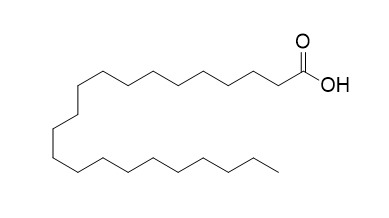Behenic acid
Behenic acid is a cholesterol-raising fatty acid in humans and is therefore not a suitable substitute for palmitic acid in manufactured triacylglycerols.
Inquire / Order:
manager@chemfaces.com
Technical Inquiries:
service@chemfaces.com
Tel:
+86-27-84237783
Fax:
+86-27-84254680
Address:
1 Building, No. 83, CheCheng Rd., Wuhan Economic and Technological Development Zone, Wuhan, Hubei 430056, PRC
Providing storage is as stated on the product vial and the vial is kept tightly sealed, the product can be stored for up to
24 months(2-8C).
Wherever possible, you should prepare and use solutions on the same day. However, if you need to make up stock solutions in advance, we recommend that you store the solution as aliquots in tightly sealed vials at -20C. Generally, these will be useable for up to two weeks. Before use, and prior to opening the vial we recommend that you allow your product to equilibrate to room temperature for at least 1 hour.
Need more advice on solubility, usage and handling? Please email to: service@chemfaces.com
The packaging of the product may have turned upside down during transportation, resulting in the natural compounds adhering to the neck or cap of the vial. take the vial out of its packaging and gently shake to let the compounds fall to the bottom of the vial. for liquid products, centrifuge at 200-500 RPM to gather the liquid at the bottom of the vial. try to avoid loss or contamination during handling.
Molecules2022, 27(3),1140.
Molecules.2024, 29(22):5261.
Nat Commun.2025, 16(1):4121.
Life (Basel).2023, 13(2):457.
CZECH MYCOLOGY2021, 73(1):1-19.
Biol Pharm Bull.2023, 46(2):245-256.
Plant Sci.2021, 313:111069.
Front Pharmacol.2020, 11:683.
J Cell Mol Med.2023, jcmm.18071.
Molecules.2019, 24(24),4583
Related and Featured Products
American Journal of Clinical Nutrition,2001 Jan;73(1):41-4.
Behenic acid is a cholesterol-raising saturated fatty acid in humans.[Pubmed:
11124748]
Dietary Behenic acid (22:0) is poorly absorbed. Because of its low bioavailability compared with other fatty acids and because of its very long chain length, the effect of dietary Behenic acid (behenate) on serum lipid concentrations in humans is assumed to be neutral.
METHODS AND RESULTS:
The objective was to establish the cholesterol-raising potential of Behenic acid by comparing the effects on lipid and lipoprotein concentrations of a specially formulated fat enriched with Behenic acid with those of palm oil (rich in palmitic acid; 16:0) and high-oleic acid sunflower oil (rich in cis oleic acid; 18:1). In a randomized, crossover, metabolic-ward study, 7 mildly hypercholesterolemic men were fed 3 natural-food diets supplemented with behenate oil, palm oil, or high-oleic acid sunflower oil. Mean serum lipid and lipoprotein concentrations and plasma triacylglycerol fatty acid composition were determined from fasting blood drawn during the final 4 d of each 3-wk diet period. Behenate oil produced mean concentrations of total cholesterol (5.87+/-0.8 mmol/L) and LDL cholesterol (4.40+/-0.8 mmol/L) not significantly different from those produced by palm oil (5.84+/-0.7 and 4.42+/-0.7 mmol/L, respectively) but significantly higher than those produced by high-oleic acid sunflower oil (5.12+/-0.5 and 3.70+/-0.6 mmol/L, respectively). There were no significant differences in triacylglycerol or HDL-cholesterol concentrations.
CONCLUSIONS:
Despite its low bioavailability compared with oleic acid, Behenic acid is a cholesterol-raising fatty acid in humans and is therefore not a suitable substitute for palmitic acid in manufactured triacylglycerols.



